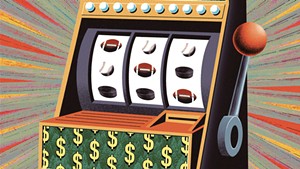
- Matt Mignanelli
I'd already sworn it off. Twice.
When online sports wagering became legal in Vermont in January, I watched the barrage of advertisements with a mix of scorn and fear. Nothing signaled social decay more clearly, I ranted to friends, than using our collective pastimes as a means to put a casino in every fan's pocket.
What I didn't mention was the fear part: I knew just enough about my own compulsive tendencies to worry that if I did download a wagering app, I might devour sports betting as if it were a bag of Lay's potato chips. As a teenager, I managed to pry myself from an Xbox addiction only by taking scissors to the Ethernet cord. That was the first time I said never again to the temptations of screen-based games.
But within weeks of the launch of online sports betting, I'd succumbed, thanks to prodding from my colleague Colin Flanders. DraftKings, one of three legal sportsbooks available in Vermont, was offering $200 in free bets to new customers. If I signed up with FanDuel, I would get more free bets — and Flanders would get a $100 referral bonus. I told no one but Flanders when I downloaded both to my phone.
With our new hobby, we turned the Super Bowl into a binge-fest. Flanders and I placed dozens of wagers on such weighty questions as whether the next running play would be to the left side of the field or the right, then compiled them into a spreadsheet to track our performance. Watching the game this way was exhilarating, but by the end, I was feeling spooked. I cashed out my modest winnings and told myself I was done. Again.
Then my editor came calling: Seven Days was offering me $100 to bet on sports and write about the experience for this Money & Retirement Issue. With some free cash and the guise of reporting, I was willing to overlook my earlier misgivings.
Perhaps unsurprisingly, I lost it all. I placed 98 bets over eight consecutive days, many on leagues and athletes about whom I knew almost nothing. With sportsbook apps on my phone, the instant thrills of gambling were always just a few taps of the screen away. At the casino, $100 might last 10 minutes at the roulette table. My $50 deposits to DraftKings and FanDuel, on the other hand, bought me hour after hour of gambling, morning until night. That was more than enough time to begin to feel myself sinking into a quicksand of compulsion.
In signing up to bet online, I joined more than 50,000 people who collectively wagered $41 million during the industry's first two months in Vermont. Lawmakers legalized sports betting last year, following nearly 40 other states that have done so since the U.S. Supreme Court opened the floodgates in 2018.
To state governments, sports betting represents a tax windfall: Vermont takes in roughly a third of the sportsbook companies' earnings on bets placed inside state borders. Officials expected to reap $7 million this way in the upcoming fiscal year. But in just two months, sports betting has already yielded $1.9 million to the state.
The booming industry combines the sophistication of big data with ubiquitous marketing, gambling psychology and the addictive tug of cellphones. I was bombarded with betting opportunities and exotic wagers, such as how many three-point baskets a player might make or whether the final score would be an odd or even number. The apps prominently featured risky bets — often parlays that combine several wagers into one — and celebrity picks to make them more enticing.
FanDuel and DraftKings inundated me with marketing pitches that described potential payouts as "profit" and dubbed promotional offers as a kind of "insurance," as if I were making sober-minded financial decisions, not rolling dice. Vermont bars companies from marketing any bet as "risk-free" if it requires the player to wager money. Instead, the sportsbooks offered daily "no-sweat bets" in which I was offered a second chance to wager if I lost my first.
Even staking $1 or $2 on a game was enough to keep me glued to the outcome. On my second night gambling with Seven Days' money, I placed 14 small bets on professional basketball and hockey games. I used the apps to keep tabs on all of them, veering between excitement and anxiety with every change in score.
No feature lured me as viscerally as "in-game" betting, also known as "live" betting. The apps offer the chance to place bets during a game that's already under way, with real-time trackers that show each play. Beneath the graphic, the ever-shifting odds for dozens of possible wagers light up like the wheels of a slot machine.
By 10:30 p.m. one night, I'd been lying in bed for hours, scrolling FanDuel and feeling unlucky. I was down $30 and wanted to win it back. Out on the West Coast, the Los Angeles Lakers game had just started, so I placed five more bets during the first quarter. I stared at my phone until the game ended, close to 1 a.m. My bets were a wash — so long as I didn't count the sleep I'd lost.
I vowed to be more disciplined in my approach and not to use the apps incessantly. My resolve lasted one day. Checking on my bets, or placing new ones, was becoming as reflexive as scrolling Instagram.
Already, my betting habits resembled what experts say are the signs of problem gambling, a possible precursor to full-blown addiction. Little losses began souring my mood, which only led me to bet more, despite the rules I'd made for myself. I began wagering on sports unfamiliar to me, such as tennis and European soccer — another possible warning sign, Dr. Kelley Klein, medical director for the Vermont Department of Mental Health, would later tell me.
I reinforced my new habit at work, where several coworkers commiserated about their own bets. We swapped stories about our narrow defeats ("bad beats") and betting theories, which allowed me to feel like the time and energy I was expending on my wagers were normal.
Many people are able to make a plan and stick to it, or bet occasionally for fun without being sucked under. Research is limited, but it suggests that the online sports-betting boom could lead to higher rates of gambling disorders, Klein said. An Ohio survey found in 2022 that 20 percent of that state's adults showed risk signs for problem gambling. Men are at particular risk, research shows, especially those who are young and college-educated.
"There is just an almost-unlimited opportunity for dopamine to be released in the brain and cause that reward reaction that we get addicted to," Klein said.
Vermont customers must be at least 21 years old to bet and can't use credit cards to fund their accounts. The Vermont Department of Liquor and Lottery could discourage compulsive use by banning in-game betting or capping the number of bets a user can place per day, Commissioner Wendy Knight acknowledged, though it has not done so. (The apps themselves do offer ways to set personal spending or time limits.)
Instead, the state will use $250,000 of its sports-betting tax revenue each year to promote responsible gambling. Setting up the system is a taller task: Vermont had few gambling-support resources before online sports betting became legal and not a single chapter of Gamblers Anonymous. The Department of Mental Health is using the funds to train a few mental health counselors in every county, Klein said. The state is also contributing to a national hotline network, 1-800-Gambler.
Although nearly 1 million wagers were placed in Vermont last month, the hotline received just nine calls related to sports betting, Knight said. Odds are that number will go up. Other states that legalized online sports betting in recent years have seen call volumes spike as much as 400 percent, Newsweek reported.
As my sportsbook account balance shrank nearly to empty, I bet on the University of Vermont men's basketball team in its America East conference championship game two weeks ago. Betting on Vermont collegiate teams is illegal during the regular season, but state regulations allow it during tournament play.
I wagered $19.26 on the favored Catamounts to cover the spread, meaning they would have to win the game by at least nine points. Tip-off time conflicted with a hike I had scheduled earlier. After a few peaceful hours in the woods, I returned to a message from Flanders. It was better that I hadn't watched the game, he said. The Catamounts had won the championship, but their five-point margin of victory was too slim to pay out for me.
In the age before sports betting, I would have celebrated the team's victory. Now fandom is more complicated. Days later, baseball phenom Shohei Ohtani and his interpreter became embroiled in a murky sports-betting scandal that involves a $4.5 million transfer from Ohtani's bank account to a bookie. That blockbuster story overshadowed another episode in which Cleveland Cavaliers basketball coach J.B. Bickerstaff revealed that he had been harassed by gambler-fans at home and courtside. Sports betting, he said, "has gone too far."
All hope is not lost, though. While reporting this story, I learned that Vermont, like other states, offers a service that allows residents to ban themselves from sports betting by adding their names to a registry, rendering them ineligible to make bets on gambling apps. The idea that I could enlist the government to avoid temptation appealed to me, despite its Big Brother undertones.
Vermont offers "exclusion periods" of one, three or five years. There's also a lifetime option. After recalling how much more I'd enjoyed hiking in the woods than agonizing over the Catamounts' margin of victory, I decided to ban myself for life. I uploaded a photo of myself holding my driver's license, entered a bunch of personal information and clicked submit. Soon, an email arrived from the State of Vermont offering resources on gambling addiction if I wanted them.
The exclusion technically only applies to me while I'm physically in Vermont, but Knight said the companies are known to apply the registry nationwide. I asked her how many people have banned themselves so far.
Turns out, I'm just the second Vermonter on the list.













Comments
Comments are closed.
From 2014-2020, Seven Days allowed readers to comment on all stories posted on our website. While we've appreciated the suggestions and insights, right now Seven Days is prioritizing our core mission — producing high-quality, responsible local journalism — over moderating online debates between readers.
To criticize, correct or praise our reporting, please send us a letter to the editor or send us a tip. We’ll check it out and report the results.
Online comments may return when we have better tech tools for managing them. Thanks for reading.